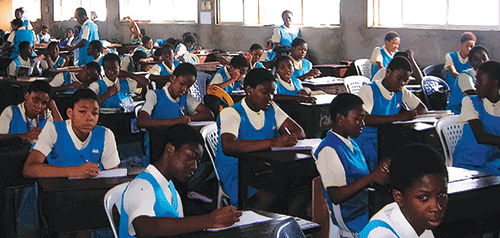With a decline in the education sector, The Education Partnership (TEP) Centre takes steps in form of a partnership to arrest the situation, writes Reporter, MARY OGEDENGBE…
The Nigerian National Planning Commission in 2004 described the Nigerian education system as “dysfunctional”. Ten years down the line, nothing much has changed. A look at the May/June 2014 West African Senior School Certificate Examination (WASSCE) mass failure, specifically in Mathematics and English results, is a pointer that all is not well with our education sector.
There is a limit to public sector’s capacity to handle formal education, even with an increasing budget allocated yearly to the sector. Also, being a country steeped in poverty, with the current statistics at 33.1 per cent despite high economic growth in the country, an average Nigerian parent can barely afford to see their children through school.
It is against this backdrop that non-governmental organisations (NGO) like The Education Partnership (TEP) Centre has taken a stand to help resolve this growing problem by devising ways to improve access to quality and affordable education in developing countries like Nigeria by using innovative programmes targeted at the poor.
At a recent launch of Centre for Education Innovations (CEI) regional hub by the TEP Centre, TheNiche gathered that the centre was established based on the novelty in the education sector ranging from funding mechanisms, technology and innovative means of providing education to the less-privileged. The process is kicked off by identifying and consequently profiling those innovators and funders who have uploaded their innovations on their site. This helps bring global visibility and connection to potential partners.
TEP Centre’s Managing Director, Dr. Mo Adefeso-Olateju, stated that so many individuals have taken up the responsibility of providing quality education for Nigeria’s poor, but due to poor documentation, their reach and expansion have been limited.
She said: “These gaps, therefore, are due to the lack of systematic and easy-to-access information about such programmes around the world. Practical lessons about successful and unsuccessful experiences are even harder to find. As a result, we are left with a world full of innovative models, but without an understanding of how they are distributed, whether they work, and how those that do can be improved, replicated and scaled up to serve more of the world’s poor.
“The programme focuses on harnessing innovations in education that have the potential to significantly increase access to quality education for Nigeria’s poor and support policy makers, funders and programme implementers in their efforts to improve and better harness the potential of the non-state sector to achieve educational goals.”
They have achieved this by bringing together innovators and funders to help strengthen their partnership, sustain their programme and increase their reach.
The CEI has begun taking steps in examining some of the emerging innovative educational models by Nigerians and for Nigeria. Thirty-one of them have been spotted and already are receiving global interest. For instance, MyLearningAcademy, a privately-owned institution aimed at bridging the educational divide in Nigeria has partnered with telecommunication giant, MTN, through the TEP Centre. This will enable students learn and appreciate education via the mobile device.
According to a representative of the MyLearningAcademy, Olugbolede Oshodi, “We have discovered that students love to spend more time on their phone, so we decided to put all their reading materials on the device.”
He said also that it would help encourage the reading culture of Nigerian students. Others include, Slum-2-School Initiative, Passnownow.com, Corona iTeach, Makoko Floating School (MFS), StayInSchool Nigeria, Campus Night School, Oando Foundation Adopt-A-School Initiative, and Chalk House Play & Learn Centres.
Some of these bodies seek to redress the rate of school attendance, which is poor, with results showing that secondary school attendance for males is 32 per cent while for females is 27 per cent. Like the Makoko Community with only one school and student strength of 187, while the majority of the remaining school-age children is out of school and engaged in small businesses, the MFS is out to fix this problem. They aim to promote school attendance and educational attainment of children in difficult-to-reach coastal areas.
The programme, overall, is targeted at those in early childhood, primary and secondary school pupils and also those interested in acquiring vocational and technical skills.
Further, the TEP Centre revealed plans to continue this work. Workshops and seminars will be held for innovators to meet funders for advisory and technical support for future works.












